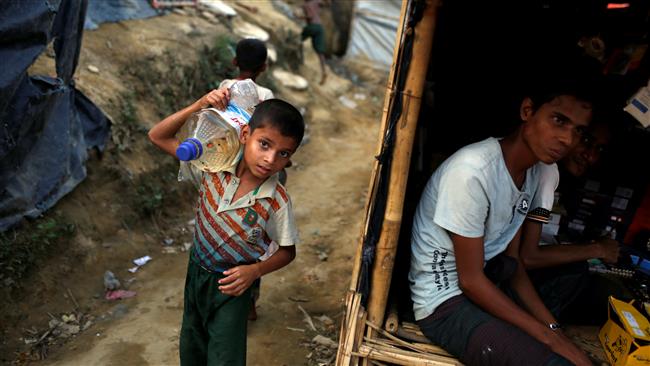Myanmar committing genocide against Rohingya Muslims, says Turkish PM
Turkish Prime Minister Binali Yildirim says the killing of Rohingya Muslims by Myanmar’s government forces is "genocide," urging the international community to ensure the persecuted minority's safety back home.
The Turkish official made the remarks after he met several members of the minority group in two refugee camps in Cox's Bazar in neighboring Bangladesh on Wednesday.
“The Myanmar military has been trying to uproot Rohingya Muslim community from their homeland and for that they persecuted them, set fire to their homes, villages, raped and abused women and killed them,” Yildirim told reporters before flying back to Turkey, noting, “It’s one kind of genocide.”
“The international community should also work together to ensure their safe and dignified return to their homeland,” Yildirim said.
Almost 870,000 Rohingya Muslims have been forced to flee Myanmar, mostly to Bangladesh, in recent years after the army launched a crackdown on the minority group in Rakhine state. About 660,000 of them arrived after August 25, when the army intensified the crackdown.
On Monday, the UN high commissioner for human rights, Zeid Ra’ad al-Hussein, said he could not “rule out that possibility that acts of genocide have been committed” in Rakhine in recent months.
He said UN investigators had heard testimony of a “consistent, methodical pattern of killings, torture, rape and arson.”

Last week, the international medical charity Doctors Without Border, also known by the French acronym Medecins Sans Frontieres, estimated that at least 6,700 Rohingya Muslims, including 700 children, had been killed in a period of one month since the renewed crackdown in August.
Separately on Wednesday, the UN’s independent investigator into human rights in Myanmar, Yanghee Lee, was barred from visiting the country for the rest of her tenure.
The special rapporteur was due to visit Myanmar in January to assess the country's human rights situation, including abuses against Rohingya Muslims in Rakhine.
But she said on Wednesday that Myanmar had told her she was no longer welcome, adding in a statement that this suggested something "terribly awful" was happening in the country.
Myanmar’s de facto leader and a Nobel peace laureate, Aung San Suu Kyi, has faced international criticism for response to the violence, which has been described by the UN as "a textbook example of ethnic cleansing."
VIDEO | US ambassador’s remarks on Israel’s expansion spark outrage
VIDEO | ‘Protect the Right to Protest’ rally held outside London court
Trump denies rift with top officer over potential Iran aggression
VIDEO | Gaza bakery supports displaced families ahead of Ramadan Iftar
France blocks US ambassador from ministerial meetings after summons no-show
Around 20 nations condemn Israeli push toward West Bank annexation
Iran pursuing broader cooperation with African nations: Pezeshkian
Israeli minister threatens to seize entire Gaza if Hamas refuses to disarm











 This makes it easy to access the Press TV website
This makes it easy to access the Press TV website